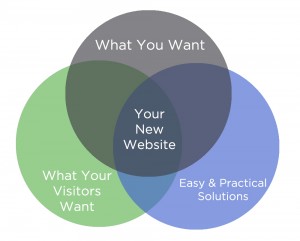As with any project, whether it’s for software development or designing a new website, having a good specification or plan of what you want to achieve is the key to success.

When you ask a web design agency “How much is a website” to some extent you’re asking them to put their finger in the air and choose a random figure. Websites come in many different shapes and sizes and additional features and design elements add a new layer of complexity and expense.
As a potential client, one of the best ways to get a web design agency to give you an accurate quote is to write a stonking specification.
Save you and the agency time, money and frustration by detailing out what it is you want and it will make it easier for them to provide accurate prices and timescales, you’re also more likely to get what you want and not their interpretation of what you want.
Your specification doesn’t have to be technical. Write your spec clearly in plain English so everyone understands it – the developers will sort out the technical stuff later. If it helps, sit down with the agency to talk through your requirements and get their opinions. Remember, they do this every day and know what works and what doesn’t. Use their expertise to help refine your needs and create an accurate picture of the website you want.
We’ve put together a list of 10 points on how to write a great specification, in order to help a web design agency give you an accurate quote and get the website you desire.
- Main aim
Why do you need a website? What do you want the website to achieve? Do you have an existing website, why do you want to change it?
- Target audience
Who is your target market? Why will they be using your website? Potential clients? Members of staff? What are their aspirations? Age group? Hobbies? Aspirations?
- Pages
How many pages you do need? What is the structure of your site? This will probably change throughout the design process but it’s good to have an idea of the layout, for example:
- Homepage
- About us
- Services
- Gallery
- Contact us
- Features/design elements
What should the website do? Do you want a brochure site? Do you want an eCommerce site? If so, how do you want customers to interact with your shop? Do they need a login? Do you want them to be able to access their full account history? Do you want a bookings calendar? How do people book? Are there specific dates they can book from and to? All of these are fundamental to the developer in order to help them to get a clear picture of how you want your website to work.
- Competitors
Who are your competitors? It’s useful to provide links of your competitor’s websites so your developer can see what they are doing and ensure your site will stand out.
- Websites you like/don’t like
If there are any websites you particularly like or don’t like make a list and provide any notes as to why you have chosen them. This will give a good indication of things you want to include or eliminate from your website.
- Budget
You may not want to disclose your budget at this stage, but this can be counterproductive. If the agency knows your budget and your objectives they can find a solution to meet both.
- Timescales
Do you have a deadline you want your website to go live? It takes time to create a website and realistic timescales will ensure both parties are happy. As a guide, a website can take anything from six weeks to six months, depending on your requirements.
- Contacts
Who will be the main contact? Who will be making decisions on the website? Ensure you provide details, email addresses and telephone numbers of those involved in the project so the agency can contact you!
- Anything else
List any points that haven’t already been covered in the rest of the document, for example:
- Provide a copy of your logo so the web designers can use elements from it.
- Who is providing the text and images? Let the agency know who to expect information from and when. Any delay in providing information can mean the deadline date has to move.
There you are, 10 points to help you produce a really good specification for a web design agency. By providing this key information you will get more detailed and accurate quotes and timescales. Just remember to keep it concise and don’t focus too much on how the website will look and feel, this will be defined during the design phase of the project.

